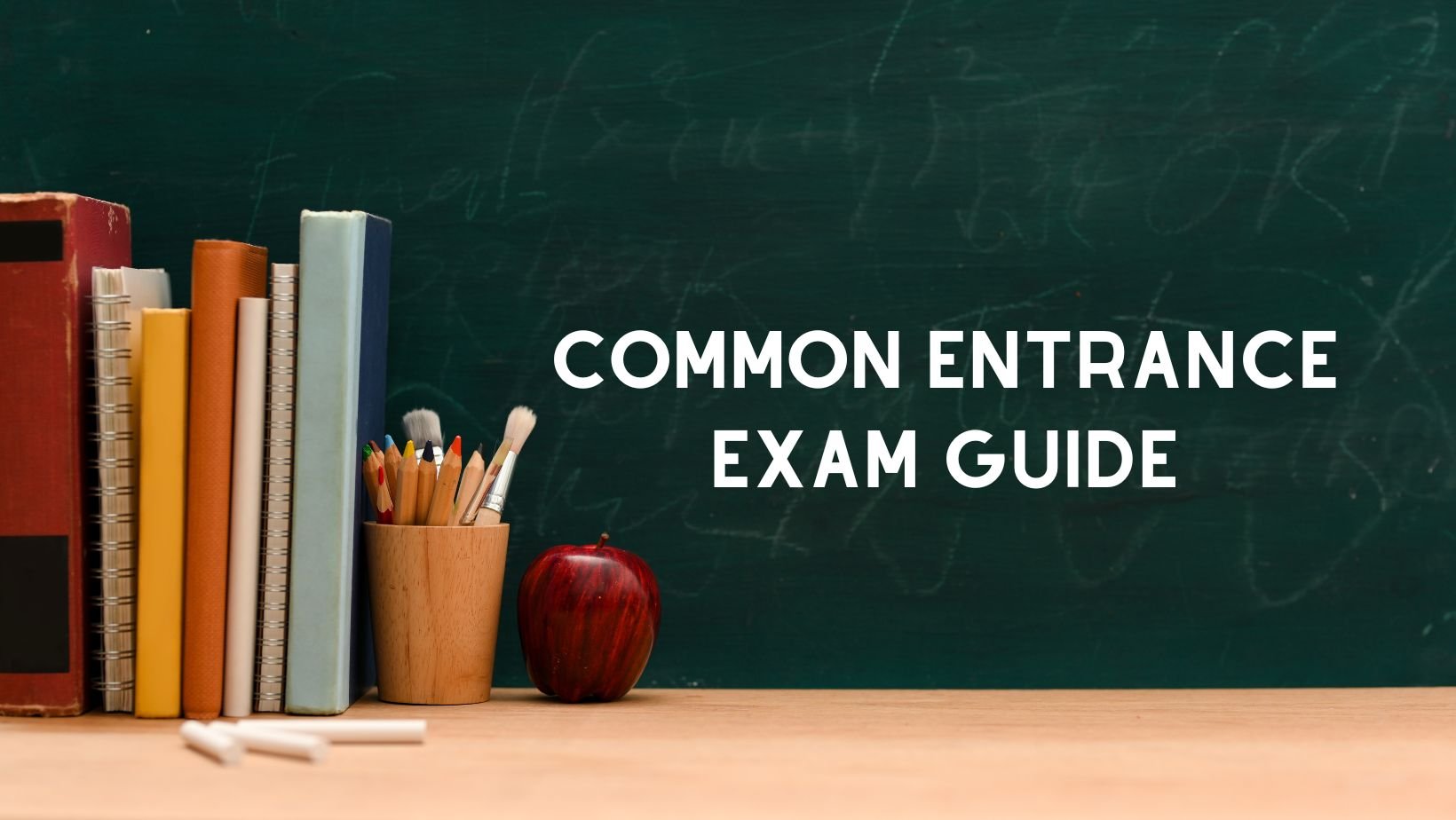A Complete Guide to Common Entrance: Exam Tips and Common Entrance Past Papers
What is Common Entrance?
The 13+ Common Entrance (CE) exam, administered by the Independent Schools Examinations Board (ISEB), is a pivotal assessment for students aiming to secure a place at independent secondary schools in the UK. Covering a range of subjects, the exam tests a student’s knowledge and skills across core areas such as Mathematics, English, and the Sciences, among others. In this blog, you'll find expert advice and tips tailored to each subject, including 13+ English, Maths and Science along with invaluable resources including access to 13+ Common Entrance past papers. Whether you're preparing for the Common Entrance exam or seeking to understand the 13+ common entrance process better, this blog offers comprehensive support.
See our guide to the ins and outs of the 13+ admissions process, here.
Common Entrance Exam Structure:
The 13+ Common Entrance exam is structured to assess students across multiple subjects. All candidates are required to sit three compulsory papers: English, Mathematics, and Science. Additionally, depending on the school’s requirements, students may also be tested in subjects such as Geography, History, Classics, Modern Foreign Languages, and Theology, Philosophy, and Religion. The exam is offered at different levels to accommodate varying abilities, with each subject typically divided into timed sections that assess specific skills and knowledge. This structure allows schools to gauge not only a student’s proficiency in core subjects but also their aptitude in additional areas of study.
Below we’ll delve into the content and structure of 13+ English, 13+ Maths and 13+ Science, offering in-depth guidance on Common Entrance preparation.
13+ English Common Entrance Tips
Content:
Reading paper (1h 10 minutes, 50 marks)
Students are given an extract from a piece of prose, a play or a poem and must respond to a series of questions testing comprehension, spelling, grammar and vocabulary knowledge.
Writing paper (1h 15 minutes, 50 marks)
Students are given a choice of four prompts and must write a piece in response to two of them:
e.g. Write a speech to give at your school assembly, encouraging pupils to take up team sports.
How to prepare for 13+ English:
Reading:
Encourage your child to read at an ambitious level to boost their vocabulary. Try the Sevenoaks Year 8 or Year 9 reading list for inspiration. As your child reads, get them to create a glossary of new words.
Make sure your child spends time reading and analysing poetry as well
Use the P.E.E structure: it’s really important the student uses evidence from the extract provided and to be confident analysing effects of language features in their response.
Students should revise appropriate terminology for different genres, particularly drama!
e.g. playwright, dramatist, cast, company, props, set, actor, stage directions
e.g. persona, poet, stanza
Writing:
Your child needs to be confident writing in different styles (e.g. narrative, descriptive, informative, discursive, persuasive) and different forms (e.g. a story; a description; a news report; a report; an information pamphlet). They should read the question carefully to understand what they are being asked to do and pay careful attention to the requirements of this form.
Always plan well before starting writing. This ensures the candidate writes a logical and coherent response. Marks are given for paragraphs, spelling, grammar and punctuation so it’s important students take time to organise and check their answers.
Are You Looking for Support for 13+ Common Entrance
We have an incredible team of 13+ Common Entrance tutors who have an expert knowledge of the Common Entrance requirements and process.
Our 13+ Common Entrance tutors can support across all 13+ subjects, offering past exam feedback and creating supplementary common entrance resources that support and simulate the common entrance exam requirements. We also have tutors specialised in specific top independent school preparation e.g. Winchester, Sevenoaks etc.
13+ Maths Common Entrance Tips
Content:
Non-calculator (60 minutes, 100 marks)
Calculator (60 minutes, 100 marks)
Mental arithmetic test (10 minutes, 40 marks)
Students should have a strong understanding of KS3 national curriculum, but should be able to expand on this to solve more sophisticated problems and draw connections between topics and subjects.
You can access the full 13+ Maths specification here or you can access Common Entrance Maths past papers here.
How to Prepare for 13+ Maths
Look for ways to simplify questions in the mental arithmetic paper e.g. Finding multiples of 10, etc. 2 × 17 × 5 = 10 × 17 or 7 × 12 > 7 × 13
Remember to include units for all answers where they’re specified!
The later part of the paper is designed to stretch and challenge students, presenting them with more unfamiliar problems to allow them to experiment. It’s important students don’t just panic and assume they don’t know the answer; they should use their foundational knowledge and practise applying it to new questions.
Show workings! ISEB have reduced the number of questions in the Maths papers in order to give students more time to think for each question so it’s crucial that they use this time to show their workings.
Students should read the question carefully. ISEB questions have less verbal scaffolding to talk students through the answers, but with careful reading and thinking students should be able to understand what the question requires them to do to reach the answer. It might help to underline key words!
Make sure to leave time to attempt all questions in the test and, crucially, to go back and check workings!
13+ Science Common Entrance Tips
Content:
Biology (40 minutes, 60 marks)
Chemistry (40 minutes, 60 marks)
Physics (40 minutes, 60 marks)
Students can use calculators and protractors.
How to Prepare for 13+ Science
Students will find a mixture of closed (e.g. multiple-choice, matching pairs, completing sentences) and open questions. They should make sure they take time to practise both formats.
The 13+ Science Common Entrance exams really emphasise thinking and working as a scientist. This means the paper is not just testing specific scientific knowledge but the skillset science encourages students to develop. Assessing objectivity, making predictions and recording observations and interpreting data skills are all crucial skills for approaching the science paper.
Students need to be confident applying their knowledge to less familiar questions in order to come up with creative solutions.
Read the question carefully and underline command words to understand what the question is asking e.g. measure, command, show
Have a look at the Common Entrance Science past papers available on the ISEB website.
Where to find 13+ Common Entrance Past Papers?
You can find the 13+ Common Entrance Past Papers available on the ISEB website. There’s also more useful information available there including the specifications for various common entrance subjects.
Common Entrance Scholarships: Common Academic Scholarship Exam
The Common Academic Scholarship Exam (CASE) is an advanced form of the 13+ Common Entrance exam, designed for students who are competing for academic scholarships at top independent schools. The CASE is set at a more challenging level, often requiring a deeper understanding and application of knowledge. The exam is structured to push the boundaries of a student's intellectual abilities in the core subjects and others according to the school’s requirements.
Three Ways to Enhance Common Entrance Performance
Start Common Entrance prep early: The most effective way you to ensure success in the 13+ Common Entrance exams is to start your preparation early. The Common Entrance exam is designed to push students and test subject knowledge. It isn’t an exam students can cram last minute revision for. It requires long-term, structured preparation to ensure the student has adequately expanded their knowledge of topics beyond the traditional year 7 and 8 syllabus has honed their exam technique in order to excel in the Common Entrance exams.
Practise with 13+ Common Entrance Past Papers: Utilising past papers is essential for mastering the 13+ Common Entrance exam. By practising regularly with these papers, students can familiarise themselves with the exam format, question styles, and time management required when they come to sit the real thing. It’s important students work to true timed conditions to spot any areas in need of improvement.
Working with a Common Entrance Tutor: Having a 13+ common entrance tutor to support students throughout the whole common entrance preparation process is a brilliant way to ensure quick improvement. A tutor can mark and feedback on 13+ Common Entrance past papers, ensuring the student approaches the final exam with a tailored preparation process that targets their areas of weakness and improves their overall performance.
Consider Co-curriculars: For strong exam and interview performance, it can be a good idea to stretch your child beyond the syllabus. For example, a student could tackle Primary Maths Challenge papers to improve their maths problem solving skills. We offer debate classes, which can be fantastic for students to hone their argument building skills ahead of essay questions and interviews. Other clubs include STEM and Python! Check out our provisions on our co-curricular division, Minds Underground.
U2’s team of Common Entrance tutors provide comprehensive preparation for all elements of the Common Entrance process, equipping students to confidently face the various challenges of the 13+ Common Entrance exam. With a deep understanding of exam criteria, U2’s 13 plus tutors are expertly positioned to teach students the strategies and techniques that can help them excel and provide personalised feedback and tailored study plans. They also build students' confidence for interview preparation, helping them anticipate likely questions and improve their communication skills.





